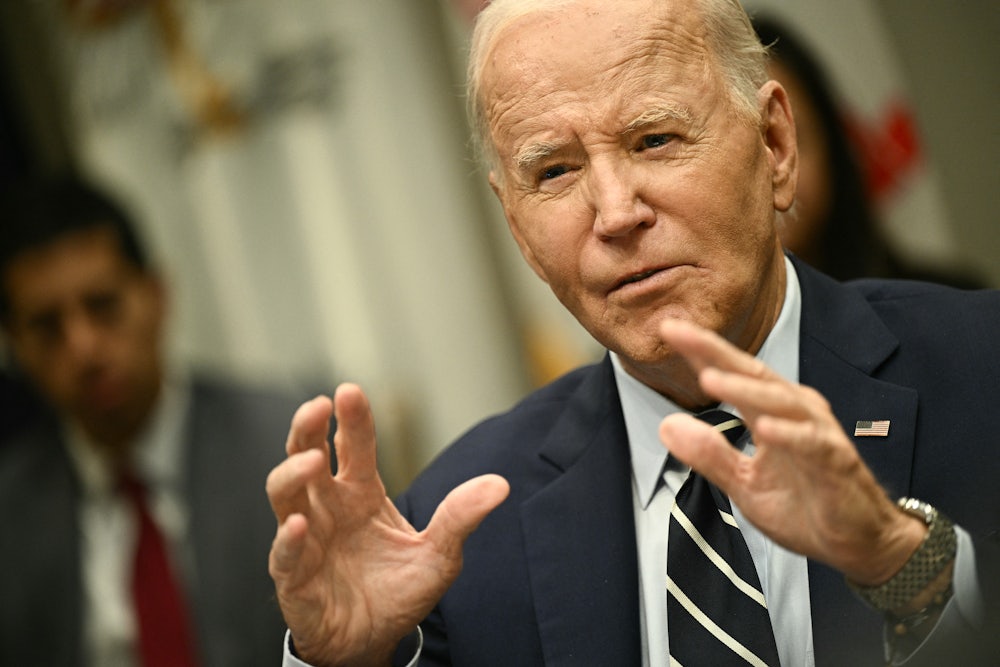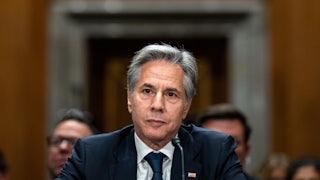“The Middle East,” national security adviser Jake Sullivan wrote last October in Foreign Affairs, “is quieter today than it has been in decades.” Days after this smug assessment, before the print edition even arrived on subscribers’ doorsteps, Hamas attacked Israel, killing over 1,200 and taking another 250 or so hostage. In response, Israel launched the military operation in Gaza that has now killed over 42,000 Palestinians and counting.
Unbelievably, Secretary of State Blinken made the exact same misstep as Sullivan two weeks ago—proclaiming in the very same magazine that the Biden administration had “put the United States in a much stronger geopolitical position today than it was four years ago,” just as Iranian ballistic missiles arced through the sky and Israel launched an invasion of neighboring Lebanon.
It may be typical for presidential administrations to periodically laud their own accomplishments in print, particularly in their waning months. But both Blinken’s and Sullivan’s articles stand out for the absurd juxtaposition of their statements with actual events. Who could honestly argue that the world feels safer than it did four years ago? That may not be solely the fault of the Biden administration, which has been beset by a series of geopolitical crises and upheavals. But even judged by modest standards, it is almost impossible to argue that Biden will leave America in a better strategic place than when he was inaugurated.
Perhaps the best case for Biden’s foreign policy is the notable improvement in America’s standing among its liberal, Western allies since 2020. The administration’s strong stance on Ukraine bolstered Kyiv’s defenses over the last two years and adroitly managed the inter-allied policy and sanctions debates that followed the 2022 invasion. Unlike their Trumpian predecessors, Biden appointees speak the language of the “liberal international order,” feting alliances and liberal values, and standing up to dictators such as Vladimir Putin. As a result, administration officials have been warmly welcomed back to transatlantic forums like the Munich Security Conference.
The Biden administration has also enhanced alliances in the Indo-Pacific, building new pacts like the Australian-British-American partnership, or AUKUS, and the Indo-Pacific Economic Framework for Prosperity, or IPEF, and engaging with existing partnerships such as the so-called Quad, made up of Australia, India, Japan, and the United States. The practical core of Biden’s foreign policy—quite aside from its thematic focus on democracy and dictatorship—has been the return of “competence,” with staff who understand how to wield the bureaucratic levers of power to focus on achievable, tangible goals. The contrast with the first Trump administration could hardly be more pronounced. Whether one wants to coordinate sanctions policies among allies, more efficiently deliver weapons to Ukraine or Israel, or organize a contentious “Summit for Democracy,” the technocrats of the Biden administration have delivered exactly what they promised: a departure from the chaos of the Trump years and a return to a competent interagency process.
Competence, however, is not the same thing as strategy. And despite the focus on process—or perhaps because of it—the Biden administration has also made many strategic errors. They have too often failed to make difficult choices, for instance in the administration’s own ambivalence about engagement with Iran, which undermined any prospect of a return to the Joint Comprehensive Plan of Action, or JCPOA. They have failed to change course when needed. Just look at the way in which the administration has continued to embrace the Israeli government’s strategy and clung to Biden’s hope for Israeli-Saudi normalization even as it has become increasingly clear that things in the Middle East are spiraling out of control. And they have failed to recognize—or accept—difficult realities, such as the shortfall in Western ammunition stockpiles and political will that makes it challenging to continue a blank-check approach to the war in Ukraine.
If anything, the lesson of Biden’s term in office is that mere competence and high-flown rhetoric is not enough to overcome indecisiveness. The administration clearly has a vision for the world, but when that vision conflicts with reality, they dither, fundamentally unwilling to accept the notion that the world may have changed—or that there are limits to what can be achieved with the direct application of U.S. power. This was perhaps most visible in Biden’s response, shortly after October 7, to a journalist who asked him whether the United States can really sustain support for Ukraine, Israel, and a variety of other contingencies simultaneously: “We’re the United States of America, for God’s sake.” This statement was clearly at odds with the administration’s conflicted policies in numerous areas.
On Ukraine, this indecisiveness has manifested as a tendency to say no to new weapons systems, before eventually saying yes. To its credit, the Biden administration clearly understood from the first days of the crisis that this was not some war of humanitarian intervention against a tin-pot Middle Eastern dictator. They sought to manage the risk of nuclear and conventional escalation while arming Ukraine, tacitly acknowledging that it would be too risky for the U.S. to engage in a direct conflict with Russia. Yet the White House has also struggled to articulate an endgame in the Ukraine war short of absolute victory, even as it has become increasingly apparent that such an outcome is not possible without significant escalation.
In the Middle East, Biden’s open-ended support for Israel has been clear and consistent, but conflicts with the administration’s strong emphasis on human rights and liberal order. The result has been contradictory and chaotic: USAID and parts of the State Department protest human rights abuses in Gaza, while other State Department bureaus work overtime to ship weapons to Israel faster. Biden himself has repeatedly propounded “red lines” for Israeli behavior—an attack on civilians in Rafah, the invasion of Lebanon—before backpedaling and downplaying Israeli actions. His newest red line, issued just this week, suggests that Israel has 30 days to address humanitarian aid concerns or risk a pause to U.S. weapons shipments. In the context of his prior indecision, though, it hardly seems a credible threat.
Biden’s vacillation has been matched by an inability to articulate an attractive or even coherent new strategy for a new era. His unofficial slogan—repeated at summits and diplomatic engagements early in his term—was often said to be “America is back.” But it might be more apt to say that all the old foreign policy ideas are back, whether they are suited for the world of today or not. Biden’s foreign policy has been conventional and rhetorically committed to the notion of America as the indispensable nation. Like Sullivan’s and Blinken’s op-eds, though, it rings hollow.
Biden’s approach isn’t just a foreign policy problem. For all the flaws of Donald Trump’s “America First” approach to foreign policy, polling suggests that the public largely prefers it to Biden’s muscular American primacy. Voters rank democracy low among their top foreign policy concerns, for example, and a significant majority support a negotiated settlement in Ukraine. This administration’s failure to offer a Democratic-leaning alternative to the foreign policy overreach of the last few decades—and Harris’s choice to double down on Biden’s policies in her campaign—in many ways cedes the foreign policy issue almost entirely to the Trump campaign.
For Biden, this is now a question of legacy. Though the president’s age-related disadvantages were enough to push the party to jettison him from the ticket this summer, they were apparently not enough for him to cede the job of managing the high stakes of U.S. foreign policy. The administration continues to argue that Biden is able to handle global crises as needed. But like the president himself, U.S. foreign policy seems increasingly stuck in the past. When the administration entered office in 2020, it sold Biden as a steady, experienced hand at the tiller, guiding the ship of state through rough waters. In the last year or so, it has instead begun to feel more like we’re drifting on a rudderless ship, hoping that something better might come along in January 2025.








